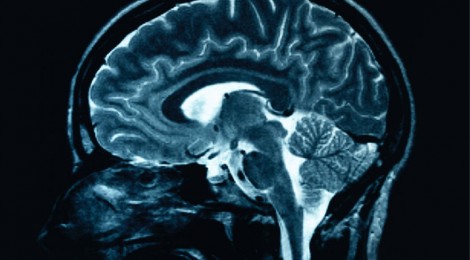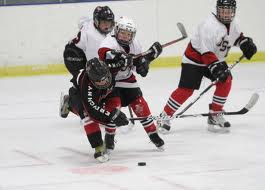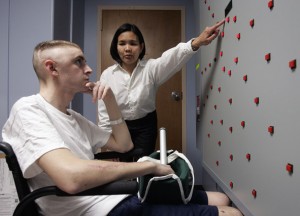
Coping with a Traumatic Brain Injury
Traumatic brain injuries (TBI) contribute to many deaths each year, and can lead to the development of secondary mental health problems. The Centre for Disease Control has reported that approximately 1.7 million TBIs occur every year, and individuals with a TBI commonly suffer cognitive impairments and developmental delays.
The Trauma & Mental Health Report recently spoke with Tricia Williams, a clinical neuropsychologist at Holland Bloorview Kids Rehabilitation Hospital, who works with children who have different forms of TBI. Williams explained how to improve child development and mental health for individuals coping with a TBI.
Q: What are the most common injuries that lead to the development of a TBI?
A: A TBI is caused when an external mechanical force, such as a blow to the head or a concussive force causes harm to the head or body. Motor vehicle accidents are the leading cause of TBIs.
Other common injuries include falls (which are common in young children and infants), sport injuries, concussions, horseback riding, interpersonal violence (fighting, gun shots, physical hits to the head by person/object), and war related injuries.
Q: How is a TBI diagnosed?
A: Professionals in emergency services diagnose a TBI in the acute state at the time of injury. They assess the severity of the injury by checking eye responses, verbal responses, motor responses, and mobile ability. CT scans are initially performed to rule out bleeding and swelling, and then an MRI may be performed as follow up. Amnesia is another way to diagnose a TBI. The degree of memory loss prior to the event, and difficulty forming new memory can provide more information about the injury. The duration of loss of consciousness can also affect the severity of the injury, which may be ranked as either mild, moderate, or severe.
Q: What is involved in rehabilitation following a TBI?
A: In the acute state, the TBI is managed medically, including neurosurgical intervention. Once stabilized at the hospital, children move on to rehabilitation. An assessment of physical, functional, and speech abilities are conducted, and occupational therapists and speech and language pathologists then work with the children. Neuropsychological assessments are conducted after the acute state to help children transition back to school. The children continue with follow-up visits to monitor the impact of the injury on developing cognitive skills.
Q: As a clinical neuropsychologist, what is your role with patients who have a TBI?
A: Children are seen as inpatients at the hospital after the injury, and are also seen as outpatients after they have transitioned home. They can be followed for many years after the injury. Typically, they are seen during transitional periods such as the transition from primary school to high school. A thorough assessment of the child’s skills (IQ, memory and learning, language, processing speed, executive functioning, academic skills, visual and motor skills, socio-emotional status) are conducted and compared to previous testing to assess the child’s progress and developing difficulties.
Q: What daily activities can become difficult for an individual with a TBI?
A: Activities that can be difficult depend on the nature and severity of the injury, the stage of recovery, and how well they have been supported. Common complaints across all injuries include: keeping up with class, forgetfulness, difficulty paying attention, and becoming easily fatigued, overwhelmed, and frustrated. Because these activities can be challenging, continued support from their physicians and neuropsychologists as well as family support is very important during the recovery process.
Q: How can secondary mental health symptoms develop from a TBI?
A: Depression is a common outcome, and can develop as a reaction to the injury or to neurochemical changes in the brain. Anxiety is also a common reaction to the injury, because if the child is old enough to understand what has happened, they might expect it to happen again. This is common for children who developed a TBI as a result of a sports injury. Children can also be anxious about their academic achievement and about performing well in school. It is important to make patients aware of potential secondary mental health symptoms. But, individuals with a TBI can also have a greater appreciation of life, as they see themselves as survivors.
Q: What advice can you offer someone with TBI?
A: Be patient with yourself and try to normalize your emotional variability. It’s important to ask for and accept help, and to find the balance between accepting what has happened and moving on. Individuals should keep in mind that while there are variable outcomes, full recovery is possible. Finding a “new normal” for oneself without becoming centered on the injury is extremely important.
Q: Do you have any further suggestions for coping with a TBI?
A: Here is a list of helpful tips:
- Take additional time on activities as needed
- Manage fatigue (with exercise/relaxation, sleep)
- Ask for repetition of key information and written outlines of key terminology
- Repeat back what people tell you to ensure you are understanding
- Use your phone or equivalent to make dictated notes and reminders with regularly scheduled playback times
- Break down (or ask someone to help you break down) larger tasks into smaller manageable parts
- Choose the time of day when you are most able to accomplish tasks that require more obvious mental effort and sustained attention
- Recognize the signs that you are losing attention/productivity or becoming overwhelmed and take a break
- Exercise can help relieve tension, improve sleep and attention
- Seek out a quiet room to complete work or practice techniques as needed
- Social support is extremely helpful
-Janany Jayanthikumar, Contributing Writer





